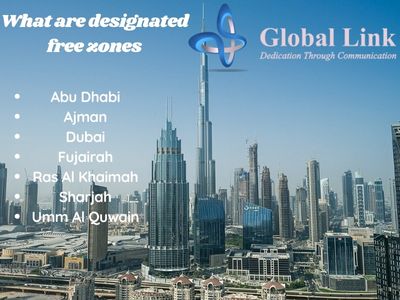Value Added Tax (VAT) is a consumption tax levied on goods and services at various points along the supply chain when value is added. It is applied throughout the UAE. However, there are certain jurisdictions within the country that are designated as free zones or special economic zones for the purpose of Value Added Tax (VAT). These designated zones are treated as being outside the UAE VAT system, meaning that goods and services supplied within these zones are not subject to VAT.
These designated zones promote economic growth and attract foreign investment, by providing a competitive business environment with streamlined procedures and reduced costs. By exempting goods and services supplied within these zones from VAT, businesses operating within designated zones can reduce costs, maximize profit margins and benefit from reduced administrative burdens and other compliance issues.
Which jurisdictions in the UAE are designated zones?
While free zones offer a range of exemptions and tax incentives and are regulated distinctly from mainland UAE, they are not automatically VAT free. Only those that meet the requirements of the Federal Decree Law on VAT are considered designated zones and can qualify for special VAT treatment on supplies of certain goods and services. There are currently 23 designated zones, as listed below:
Abu Dhabi
- Free Trade Zone of Khalifa Port
- Abu Dhabi Airport Free Zone
- Khalifa Industrial Zone
- Al Ain International Airport Free Zone
- Al Butain International Airport Free Zone
Ajman
- Ajman Free Zone
Dubai
- Jebel Ali Free Zone (North-South)
- Dubai Cars and Automotive Zone (DUCAMZ)
- Dubai Textile City
- Free Zone Area in Al Quoz
- Free Zone Area in Al Qusais
- Dubai Aviation City
- Dubai Airport Free Zone
- International Humanitarian City – Jebel Ali
Fujairah
- Fujairah Free Zone
- Fujairah Oil Industry Zone (FOIZ)
Ras Al Khaimah
- RAK Free Trade Zone
- RAK Maritime City Free Zone
- RAK Airport Free Zone
- Hamriyah Free Zone
- Sharjah Airport International Free Zone
Umm Al Quwain
- Umm Al Quwain Free Trade Zone in Ahmed Bin Rashid Port
- Umm Al Quwain Free Trade Zone on Sheikh Mohammed Bin Zayed Road
What are the requirements for a designated zone to be considered outside the scope of VAT?
In the UAE, for a designated zone to be outside the scope of VAT, it must meet the following criteria:
- The designated zone must beafenced off area that has security measures in place to restrict entry and exit.
- The designated zone must be approved and licensed by the Federal Tax Authority (FTA).
- The designated zone must be designed to promote economic activity and attract foreign investment.
- The designated zone must have customs control in place, with goods entering and exiting the zone subject to customs procedures.
- Goods entering the designated zone must be considered as being outside the UAE for VAT purposes.
- Goods supplied within the designated zone must not be released into the UAE.
- Services supplied within the designated zone must be supplied to a customer who is also located within the designated zone.
Are all supplies within designated zones free from VAT?
No, not all supplies within designated zones in the UAE are free from VAT.Only supplies of goods and services that meet the following conditions are treated as being outside the scope of UAE VAT.
- The goods must be imported into the designated zone from outside the UAE, or they must be moved from another designated zone within the UAE to the designated zone in question.
- The goods must not be released from the designated zone into the rest of the UAE.
- The services must be supplied to a recipient who is also located within the designated zone.
If these conditions are not met, then the supplies of goods and services within designated zones will be subject to VAT at the standard rate of 5% in the UAE.
Challenges designated zone registered companies face with compliance
Although businesses operating within designated zones in the UAE can benefit from VAT exemptions, they may still encounter certain difficulties and challenges when it comes to VAT compliance. Some businesses have complex supply chains that involve multiple parties and cross-border transactions. This can make it difficult to accurately determine the VAT treatment of their supplies, to manage customs procedures and to maintain accurate records of transactions. A lack of clarity or inconsistency in the interpretation of the VAT rules can also make it difficult for businesses to fully understand their obligations.
How can Global Link help?
Global Link has over 16 years’ experience working with local and global businesses, providing bespoke consultancy services for company incorporation in Dubai and the wider UAE.
We can provide guidance on the application of VAT within designated zones, helping you to identify areas of non-compliance and developing a plan to address them. We can also assist you with maintenance of proper records of all transactions including imports, exports and supplies within the zone to ensure that you are compliant with all relevant regulations.
If you need advice on this or any other company incorporation, visa or PRO service, please get in touch with us on +971 4 553 9901 or email us at [email protected] and we will be happy to assist you.


